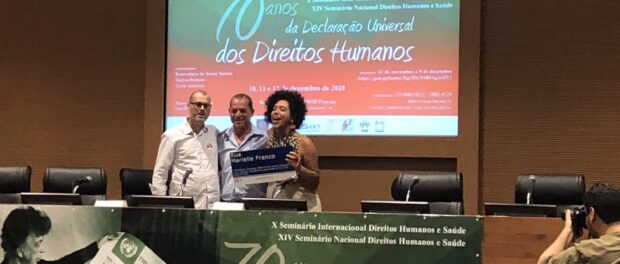
December 10 marked the 70th anniversary of the Universal Declaration of Human Rights. To commemorate the day, the 10th International Human Rights Seminar and the 14th National Seminar on Human Rights and Health were held at the Fiocruz National School of Public Health on December 10, 11, and 12. The event was organized by the Department of Human Rights and Health at the Sergio Arouca National School of Public Health (ENSP), in partnership with the Fiocruz Center for Strategic Studies (CEE–Fiocruz), the Fiocruz Workers’ Union (ASFOC–SN), the Brazilian Center for Health Studies (CEBES) and the organization Judges for Democracy. The event also featured speakers like Portuguese sociologist Boaventura de Sousa Santos; Ambassador Celso Amorim; and Niterói city councillor and incoming member of Congress, Talíria Petrone. In addition, there were several cultural activities, such as performances by the group Música na Calçada and of the play Luiz Gama—A Voice for Freedom.
Challenges of a Recent Democracy
Felipe Machado, from the Department of Human Rights, Health, and Cultural Diversity (DIHS) at Fiocruz, opened the second day of the seminar by expressing the honor and satisfaction of having Talíria Petrone present at such a critical moment for human rights in Brazil.
Petrone, who was recently elected, then talked about the fragility of countries such as Brazil—and Latin America in general—since they are often characterized as democracies that have failed to provide minimum standards of fundamental rights for their populations: ‘’We are still fighting for first-generation human rights, such as the right not to be tortured, for example… We formally ended the military dictatorship, but torture still takes place in favelas, torture still takes place in prisons. This needs to be said.’’
Furthermore, Petrone conveyed the urgency of talking about memory, truth, and justice given the systematic attempt to violate memories of what we are as a Brazilian nation, without which there is no way to resist. In her view, Brazil should be advancing with regard to constitutional rights, rather than still needing to fight to guarantee basic necessities. “Democracy has not reached favela and peripheral territories—for black, poor, LGBT, indigenous, and quilombola populations… If we consider the period of formal democracy, it’s shorter than the period of democracy’s absence… and the period of legalized slavery is longer than the period of non-slavery,’’ stated Petrone. For this reason, she argues that the anti-racist struggle is structural and transversal to all other struggles.
Petrone also touched on the trend of setbacks to democracy and the advance of authoritarianism, asking listeners to remember “which bodies are left behind along the way” in this process. “With each retreat of democracy, the potential for rights violations increases. These violations do not affect all human beings in the same way: those who were already unable to live with dignity and equity are the most impacted.” Petrone cited the preliminary report of the Inter-American Commission on Human Rights, which visited Brazil in November. In Petrone’s words, the report states “that the country has not been able to solve its main historical debts with regard to citizenship and the structural problems of severe inequality and discrimination, particularly racial and social [discrimination].”
Petrone also brought up the subject of the country’s indigenous and quilombola populations, highlighting the right to territory, nature, and agroecology, and referring to the increase in violence in rural areas and the abusive use of pesticides. She also mentioned the issue of the mass incarceration of the black population and the scale of state violence—not directly referring to violence committed by public security officers, as they also suffer violations: “In the state of Rio de Janeiro, for every five murders, one is at the hands of authorities—and in Niterói, 88% of murdered youth are black.”
Times of Uncertainty
Petrone pointed out some particularities of the scenario for the next four years, characterizing the incoming administration as ultra-neoliberal—poised to maintain the logic of freezing investments in education, healthcare, and social services—with fascist and authoritarian features, legitimizing violence and hate as a strategy of mobilization, as well as elements of conservatism. She argues that it is necessary to return to communities and invest in creating networks of human rights defenders, discussing real rights and confronting threats to democracy through concrete [action] and engagement. “I like to say that politics is the price of bread, the bus fare, whether or not houses will collapse due to heavy rains, whether or not children will go home alive… politics is the reality of everyday life, just as human rights are.”
Lastly, Petrone cited Marielle Franco: “She represented everything that we talked about: a black woman from the favela who loved women and was a socialist, human rights defender, and politician in a country where those who embody this combination of characteristics are the ones left behind with the advance of rights violations and the retreat of democracy.”

